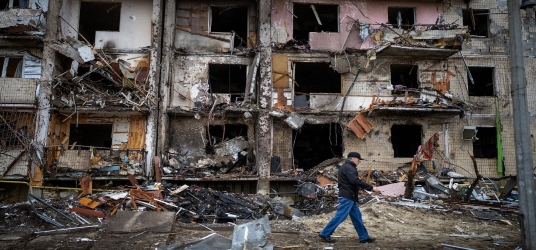Last week, a CNN panellist discussing Russia’s war on Ukraine remarked:
“So, what is NATO going to do if – you know, it’s one thing for sarin gas to be used on people in faraway Syria who are Muslim and who are of a different culture. What is Europe going to do when it’s on European soil done to Europeans?”
Though shocking to say the least, by now, such overtly racist and dehumanising depictions of non-white suffering have become, unfortunately, a ritual bigotry across much of Western media’s coverage of the conflict so far.
‘Not your average war’
Since the start of the war, news reports from across Europe and the US on Ukrainian victims of Russia’s aggression have been awash with gratuitous references to violence and refugees stemming from conflicts in the Global South.
Deployed, it seems, to elicit sympathy from Western audiences who have otherwise become desensitised to war as a faraway and forgotten menace, the implicit purpose of these references is to highlight and underscore the suffering of relatable, “civilised” Europeans by contrasting it with the plights of non-white populations whose afflictions we in the West are well-accustomed to. That is to say, this isn’t your run-of-the-mill middle eastern conflict or routine refugee crisis – this is war in Europe.
A pervasive problem
A case in point can be seen in a recent Telegraph column by former Conservative MEP, Daniel Hannan, who solemnly declared that war is no longer reserved for “impoverished and remote populations”, but rather a phenomenon now affecting people who “seem so like us”, adding clearly that this “is what makes it so shocking.”
Broadcast media too, has been particularly culpable of what some have termed the media’s ‘racist exceptionalism’. A segment aired on ITV’s flagship programme, “This Morning”, shows presenter Mathew Wright discussing rumours of Russia’s use of thermobaric weapons in Ukraine, before adding, “which to be fair, the US has used in Afghanistan, but the idea of it being used in Europe is stomach-churning.” The obvious connotation here, is that it is somewhat “acceptable” to inflict brutality on the Global South, whilst it remains reprehensible in Europe.
In another dispatch by ITV, a reporter emphasised that Ukraine “is not a developing, third world nation”, describing the outbreak of war in Europe as “unthinkable”. While continually problematic, the latter remark is also guilty of glossing over the genocide of Bosnian Muslims in a European war less than 30 years ago.
https://twitter.com/EoinHiggins_/status/1499567290836205571?s=20&t=MY5qc6qFZ3FENGMdckxZBQ
Flip the channel to France and these flagrant takes are just as frequent. On BFMTV, one of the country’s most-watched news stations, one commentator condemned Russia’s invasion by pointing out that “we are in the 21st century, we are in a European city and we have cruise missile fire as though we were in Iraq or Afghanistan”, while another, on the subject of refugees, emphasised that “we’re not talking here about Syrians fleeing war… We’re talking about Europeans.”
Across the pond, a Kyiv correspondent for American broadcaster, CBS, was equally brazen, highlighting the tragic toll of war on Ukrainians by callously reminding viewers that “this isn’t a place like Iraq or Afghanistan that has seen conflict raging for decades. This is a relatively civilised, relatively European – I have to choose those words carefully, too – city.” Very careful indeed.
Even Qatar-based Al Jazeera has not been immune to these toxic tropes. In a discussion on Ukrainian refugees, news anchor, Peter Dobbie, sought to underline the gravity of residents fleeing Kyiv by describing them as “prosperous, middle-class people” who are “not obviously refugees trying to get away from areas in the Middle East,” before adding that “they look like any European family that you’d live next door to.”
Editorial double standards
These cases present only a brief snapshot of the media’s incessant impulse to reduce the plights of people of colour to a racist talking point that serves only to frame and emphasise the peril afflicting Ukrainians.
And whilst many of the aforementioned outlets and journalists have since apologised or issued clarifications for their remarks (the CNN panellist stressed she was describing “NATO’s logic”), this pattern of reporting and commentary cannot be simply parried away as a series of unfortunate faux pas. Rather, it reveals a more entrenched editorial double standard on the way crises and their victims are covered by our media.
Ukrainian victims of Putin’s barbarity are worthy of our unconditional support and solidarity – without needless juxtapositions that minimise one group’s traumas to underscore those of another. The media must do better.
Photo by Annie Spratt on Unsplash
Political consultancy
The Whitehouse team are expert political consultants providing public relations and public affairs advice and political analysis to a wide range of clients, not only in the United Kingdom, but also across the member states of the European Union and beyond. For more information, please contact our Chair, Chris Whitehouse, at chris.whitehouse@whitehousecomms.com.
More on the war in Ukraine can be found here.


